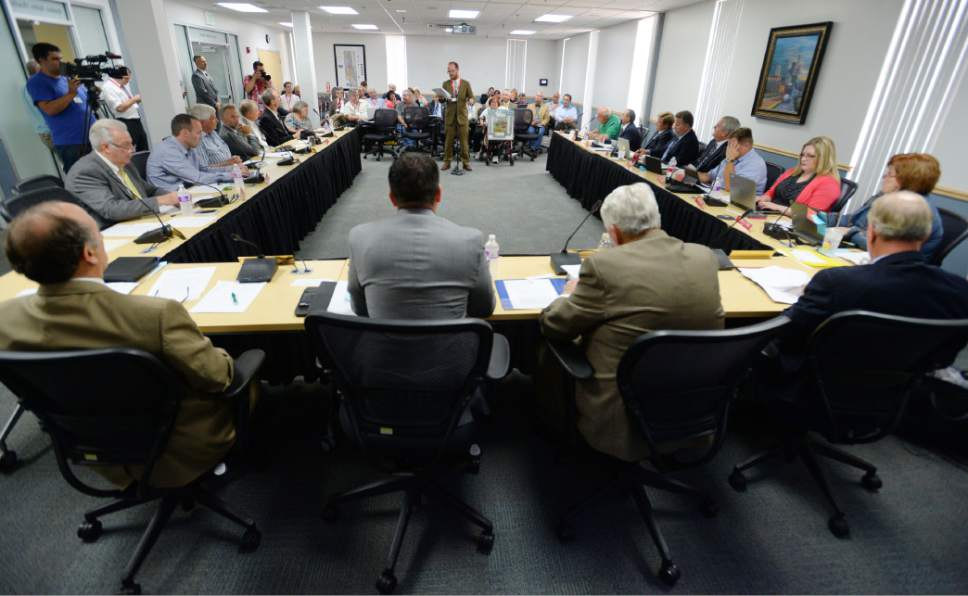This is an archived article that was published on sltrib.com in 2016, and information in the article may be outdated. It is provided only for personal research purposes and may not be reprinted.
Amid renewed vows by the Utah Transit Authority for more transparency, legislators warned Wednesday of pending bills to change how the UTA board is chosen.
The Legislature's Transportation Interim Committee also heard calls from the public to either have the transit board elected directly by voters or to have an appointed board made up entirely of elected officials.
Currently, the 16-member UTA board is appointed by a variety of local governments and state officeholders in the six counties it serves. Only three board members hold elected office: Two are county commissioners and one is a mayor.
"There are multiple bill files opened up on this issue this year," advised Sen. Wayne Harper, R-Taylorsville, co-chairman of the committee. That comes after years of controversy at UTA, so Harper said he wanted a discussion of options and reforms the agency is pursuing.
The committee heard calls by two outside groups to change how the UTA board is selected.
Kathy Van Dame, a board member of the Breathe Utah clean-air group, called for changing to an appointed board of elected officials.
That model is used by the Wasatch Front Regional Council, which plans and prioritizes regional transportation projects. Van Dame said that group has proven to be responsive and accountable, adding, "We think that is a really workable model."
Davis County Commissioner P. Bret Millburn, who is also a UTA board member and chairman of the Wasatch Front group, said having an appointed board full of elected officials "seems to be a very good model, and there is accountability back to the people" because members still must answer to voters.
Meanwhile, George Chapman, of the Utah Transit Riders Union, a group of UTA riders that seeks improved service, said his association favors direct election of the UTA board.
Directly "elected officials on the board would be more receptive, would communicate more with the public," Chapman said. "Elected officials would provide enough trust to hopefully get UTA a tax increase to provide more service."
Voters in the state's two largest counties — Salt Lake and Utah — turned down a ballot proposal last year to boost sales taxes for transportation and transit amid widespread public skepticism about UTA. Box Elder County also defeated the measure, while Davis, Weber and Tooele counties passed it.
UTA General Counsel Jayme Blakesley said 60 percent of transit boards nationwide are chosen in ways similar to UTA's current board. Only 17 percent have appointed boards comprised of elected officeholders, he said, and just 3 percent have members elected by voters.
Harper and Rep. Jake Anderegg, R-Lehi, suggested that the UTA board consider a model used by many city councils to assign each board member to oversee specific agency operations, and become experts in those areas.
Chapman has attended meetings of the UTA board for years and said he has seen it improve oversight recently.
"Before, the board would pretty much rubber-stamp anything that came to them," he told lawmakers. But he said in the past few months, members have been asking tougher questions and seeking better answers and information.
Meanwhile, new UTA board Chairman Robert McKinley vowed more accountability after years of continuing controversy over high UTA executive salaries and bonuses, extensive international travel, sweetheart deals with developers and, most recently, proposals to close the board's committee meetings to the public.
McKinley told lawmakers the agency has in recent years replaced all its top executives, cut and restructured pay and bonuses, required board approval for international travel, and given closer scrutiny to its transit-oriented developments to ensure deals are proper.
"We will have our meetings open to the public, and the public will be made aware of them," he said — after controversy earlier this year about whether that is the case.
McKinley said Wednesday that UTA is still reviewing how to restructure its committees, but assured that all meetings will be open.



